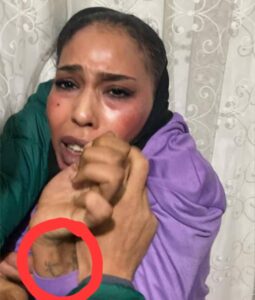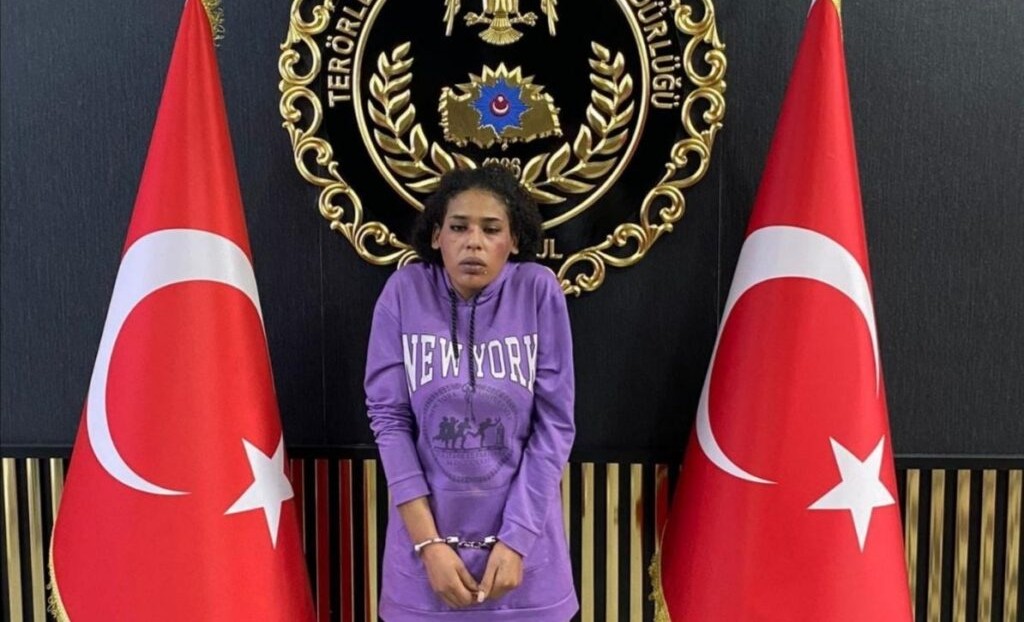Social media was abuzz with questions from Turks about Ahlam Albashir, who was detained by Turkish police on suspicion of a bombing in İstanbul that killed six people and injured more than 80.
The Turkish government says Albashir is a Syrian national trained by the outlawed Kurdistan Workers’ Party (PKK), which is listed as a terrorist group by Ankara and much of the international community and has waged a deadly insurgency for Kurdish self-rule in southeastern Turkey since the 1980s.
However, surprising observers, the PKK and Syrian Kurdish militant group the Peoples’ Protection Units (YPG) have denied any role, raising questions on social media and elsewhere about the official line.
A Turkish official said the possibility of the Islamic State in Iraq and the Levant (ISIL) being responsible for the attack was “not entirely disregarded.”
Earlier television news reports showed images of a person who appeared to be a woman leaving a package next to a raised flower bed in the middle of the avenue just before the attack.
A day after the attack, police detained Albashir in a house raid in İstanbul, and footage showed her with make-up and nail polish on as she was taken from the house wearing a purple sweatshirt with the words “New York” on it. Her shoulders were raised and her face was bruised in a photo shared by the police.
Fotoğrafa bakınca dövme dikkatimi çekti. Bu dövme Amharca yada Tigrinya dilinde bir dövme. Bu dili Etopyalilar yada Eritreliler kullanır. Bu bölgedeki müslümanlar dövme yaptırmaz, müslüman olmayan kişiler dövme yaptırır. Kişinin Suriyeli olma ihtimali yok yani. ! https://t.co/xzNuWOfqHc
— Çubuk Kraker ® (@Saltystickk) November 14, 2022
Twitter users pointed to a tattoo on Albashir’s wrist, which some say was written in the Tigrinya language, an Ethiopian Semitic language commonly spoken in Eritrea and in northern Ethiopia’s Tigray region.

This woman looks neither Kurdish nor Syrian. She looks North African. https://t.co/SiCzaNwW3I
— Graeco Levantine (@GraecoSyrian) November 14, 2022
The tattoo, coupled with Albashir’s complexion and facial features, led to speculation that she was not from Syria but from Eritrea or Ethiopia.
Either you wear a hijab and are a member of IS and the like, so a radical Islamist terrorist, or -like the Min of the Interior announced the other day- you are a member of PKK, which is a Marxist/far-left radicalised terror group. Her style of outfit is contradictory either way
— Betty
(@Betty_B001) November 14, 2022
Some pundits also highlighted the differences between Sunday’s attack and the modus operandi of the PKK and ISIL since both groups tend to send their militants on suicide missions in bomb attacks rather than aiming for their escape.
Suriyeli saldırgan Ahlam Albashir…
İstihbarat ve eylem eğitimi alan birisi neden saldırı sonrası evine gider? Soğukkanlılık gerektiren terör eylemini gerçekleştiren birisi neden bu kadar korku dolu olur?
PKK/PYD bağlantısını itiraf ederken PKK neden biz yapmadık der?#Taksim pic.twitter.com/T1khZRoSiP— Aslıhan Elibol (@Elibol24) November 14, 2022
A member of the opposition Good (İYİ) Party tweeted that Albashir’s demeanor during the raid did not resemble that of a militant radicalized enough to carry out such an attack targeting civilians.
Uyarıyorum, Ahlam Albashir'in can güvenliği gerçeklerin ortaya çıkması için önemlidir. #taksimpatlama
— Sezai Temelli (@SezaiTemelli) November 14, 2022
Pro-Kurdish Peoples’ Democratic Party Co-chair Sezai Temelli warned on Monday against threats on Albashir’s life, implying that she might be targeted to prevent her testimony in a court of law.
If you ever want to see a marvel of a media-government machine it's worth following Turkish media…how it goes from "we don't know much about this explosion" to "here we have all the details of this well trained terrorist who looks not well trained at all and was found quickly."
— Seth Frantzman (@sfrantzman) November 14, 2022
Seth Frantzman, senior Middle East correspondent and Middle East affairs analyst at The Jerusalem Post, took a jab at the Turkish government and pro-government media’s haste to jump to conclusions after terror attacks in a series of tweets.
“How often does it happen that a terrorist is caught within a few hours of an attack and every detail is known? I mean after 9/11 it took a long time to piece things together; only Ankara can solve these cases so quickly and without any critical media questions,” Frantzman said.
The bomb attack in İstanbul can help boost a security-focused campaign for Turkish President Recep Tayyip Erdoğan and even a Syria military intervention ahead of the 2023 elections, according to a Reuters analysis.
The attack, which came seven months before an election in which Erdoğan hopes to extend his 20 years in power despite Turkey’s deep economic troubles, has put national security back on the political agenda.
A bomb blasted in Istanbul, possibly coming to Erdogan's aid in the election year, just like what happened in 2015. According to polls he is losing against almost all possible candidates, and many warned that there might be provocations to turn the tide.https://t.co/hD7TqdjZ9h
— Devrim Umut Aslan (@Aslan_D_U) November 13, 2022
The bombing was reminiscent of violent attacks that killed hundreds in 2015, when Erdoğan’s Justice and Development Party (AKP) lost its majority in parliament but won it back after frequent bombings helped his security-focused election campaign.




